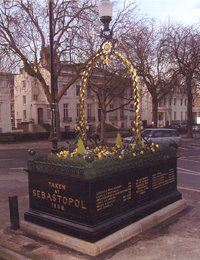Showcase result
Cheltenham Crimea Memorial
Town or City: Cheltenham
County: Gloucestershire
Country: England
WMT Reference Number: WM1855
Value of grant: £9030.00
Type of memorial: Freestanding
Type of work: Restoration
Grant scheme: English Heritage/Wolfson Foundation Grants
Year: 2008
UKNIWM reference number: 2070
 This Grade II listed memorial is located in front of the Queen’s Hotel on the Promenade, Cheltenham, Gloucestershire. It is formed of a large black rectangular cast iron plinth which used to support a cannon. Around the top of the plinth is a low barrier of metal spikes with short metal posts with spherical finals at the corners, and the area within this barrier is now used as a planter for flowers. The memorial is spanned by a decorative arch painted in gilt and green, surmounted by a lamp. Underneath the lamp, supported by the arch, is a badge containing the monogram VR. There is gilded lettering around the faces of the plinth.
This Grade II listed memorial is located in front of the Queen’s Hotel on the Promenade, Cheltenham, Gloucestershire. It is formed of a large black rectangular cast iron plinth which used to support a cannon. Around the top of the plinth is a low barrier of metal spikes with short metal posts with spherical finals at the corners, and the area within this barrier is now used as a planter for flowers. The memorial is spanned by a decorative arch painted in gilt and green, surmounted by a lamp. Underneath the lamp, supported by the arch, is a badge containing the monogram VR. There is gilded lettering around the faces of the plinth.
Over the years, the war memorial had been painted battleship grey, the metal had begun to corrode and some decorative details had been lost. In January 2008 English Heritage and the Wolfson Foundation granted £9,030 towards work to conserve the memorial and to return it as far as possible to its original appearance. The memorial was moved to a conservator’s workshop to dismantle it. Investigations showed that fourteen layers of paint had been used on the memorial over time, and the original paint scheme was black on the base, with gold lettering, archway, and flowers and green leaves. The current decorative arrow finials below the lamp, and the lamp itself were shown to be later additions. However, the old photographs available were not detailed enough to see what the originals looked like and therefore it was decided to conserve the elements as they were, rather than replace them. Other features of the archway had to be re-cast, such as the flowers and leaves. The main body of the plinth had some cracks, which were repaired by fixing metal straps over the back on the inside of the base.
The iron base had originally been made to support one of a pair of Russian cannon seized after the battle of Sebastopol during the Crimean War. In 1857, Mr Davis, the proprietor of the Queen’s Hotel, read in a news article that town of Colchester had asked for two Russian cannon, which were part of a group then at Woolwich Arsenal. When Cheltenham MP Capt Berkeley successfully applied for two of the canon, Mr Davis agreed to pay for them to be brought to Cheltenham as he thought that they would make a fine war memorial outside his hotel. He formed the Sebastopol Gun Committee for this purpose and the guns were erected on 5th July 1858. The lanterns on top of the guns were added in 1860 after the committee decided the lighting of the Promenade would deter local ‘bad characters’ from the area.
During World War II, the cannon were removed and melted down for munitions. One of the bases remained and was turned into a flower bed, still with the lantern on top.
Today the war memorial can be seen in its restored state and original colours.
The inscription on one end of the plinth, referring to the original cannon, reads
"Taken
at
Sebastopol
1856"
The dedication on the side of the memorial reads
"To the memory
of the men
connected with
Cheltenham
who fell in the
Crimea"
And on the other
"To the memory
of the officers
connected with
Cheltenham
who fell in the
Crimea"
Their names are recorded on the sides of the plinth.
Further information
War Memorials Trust reference WM1855
UK National Inventory of War Memorials: 2070
The memorial is listed building number 475686
If you have a concern about this memorial please contact the Trust on conservation@warmemorials.org


